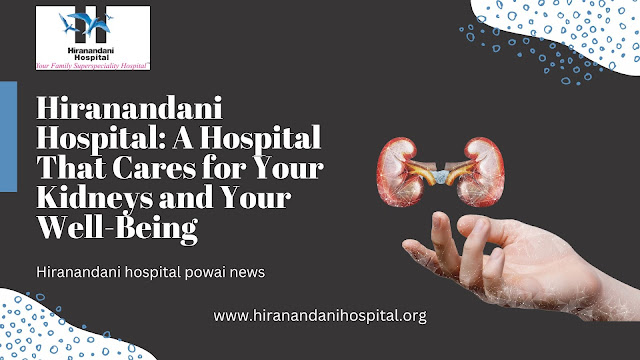The Impact of Hydration on Kidney Health - Dr L H Hiranandani Hospital Kidney
Our bodies are amazing machines, constantly working behind the scenes to keep us healthy. Among these tireless workers are the kidneys, two bean-shaped organs that play a vital role in filtering waste products and excess fluids from our blood. But just like any machine, our kidneys need the right fuel to function optimally — and that fuel is water.
In this blog, we’ll delve into the fascinating world of hydration and explore its profound impact on kidney health. We’ll discuss how dehydration can pose a threat, the benefits of staying hydrated, and some practical tips to ensure you’re drinking enough fluids for optimal kidney function.
Why are Kidneys So Important?
Kidneys are silent guardians, working tirelessly to maintain a healthy internal environment. Their primary function is to filter waste products, toxins, and excess fluids from the blood. These waste products are then combined with water to create urine, which is eventually eliminated from the body, says Dr L H Hiranandani Hospital Kidney.
Here’s a closer look at some of the key functions of kidneys:
- Filtration: Kidneys act as a sophisticated filtration system, removing waste products like creatinine, urea, and ammonia from the blood.
- Electrolyte Balance: They play a crucial role in maintaining a healthy balance of electrolytes, essential minerals that regulate various bodily functions like muscle contractions and nerve impulses.
- Blood Pressure Regulation: Kidneys help regulate blood pressure by controlling blood volume and production of hormones like renin.
- Red Blood Cell Production: They stimulate the production of red blood cells by releasing erythropoietin, a hormone vital for oxygen transport
As per Dr L H Hiranandani Hospital kidney transplant department, When kidneys function properly, they contribute significantly to overall health and well-being. However, impaired kidney function can lead to a buildup of toxins in the blood, electrolyte imbalances, and other serious health complications.
The Dehydration Threat: How Lack of Water Can Harm Your Kidneys
Dehydration occurs when the body loses more fluids than it takes in. While occasional mild dehydration may not cause significant harm, chronic dehydration can pose a threat to kidney health.
Here’s how dehydration can negatively impact your kidneys:
- Concentrated Urine: When dehydrated, the body conserves water by producing less urine. This concentrated urine can lead to the formation of crystals, which can eventually develop into kidney stones.
- Reduced Blood Flow: Dehydration can decrease blood flow to the kidneys, which can impair their ability to filter waste products effectively. This can put a strain on the kidneys and potentially lead to damage over time.
- Increased Risk of Infections: Dehydration can also increase the risk of urinary tract infections (UTIs). UTIs occur when bacteria enter the urinary tract and multiply. Adequate hydration helps flush out bacteria, preventing them from establishing themselves and causing infection, says Dr L H Hiranandani Hospital kidney care unit.
The Benefits of Staying Hydrated for Healthy Kidneys
The good news is that staying hydrated offers a multitude of benefits for your kidneys, including:
- Reduced Risk of Kidney Stones: Adequate water intake dilutes urine, making it less likely for crystals to form and clump together, thereby reducing the risk of kidney stones.
- Improved Kidney Function: Drinking enough fluids helps the kidneys function optimally by ensuring proper blood flow and filtration of waste products.
- Lower Risk of UTIs: Flushing out bacteria through regular urination helps prevent UTIs, which can sometimes travel up the urinary tract and cause kidney infections.
- Overall Health Benefits: Proper hydration benefits the entire body, including improved cognitive function, better physical performance, and healthier skin.
How Much Water Should You Drink for Optimal Kidney Health?
There’s no one-size-fits-all answer to this question as individual fluid needs vary based on factors like activity level, climate, and overall health. However, a general guideline suggests that most healthy adults should aim for around 8 glasses (2 liters) of water per day.
Here are some additional tips to ensure you’re staying hydrated:
- Listen to Your Thirst: Thirst is a natural indicator of dehydration. Don’t wait until you feel thirsty to drink water. Aim to sip water throughout the day, even if you don’t feel parched.
- Monitor Your Urine Color: Your urine color can be a good indicator of hydration levels. Ideally, your urine should be pale yellow or straw-colored. Darker urine suggests dehydration, while very clear urine might indicate overhydration.
- Consider Your Activity Level: If you exercise regularly or work in a hot environment, you’ll likely need to drink more fluids to compensate for water lost through sweat.
- Choose Water Over Sugary Drinks: Sugary drinks like soda and juices can contribute to weight gain and other health problems. Water is the best and healthiest choice for hydration.
- Eat Water-Rich Foods: Incorporating fruits and vegetables with high water content like watermelon, cucumber, and celery can also contribute to your



Comments
Post a Comment